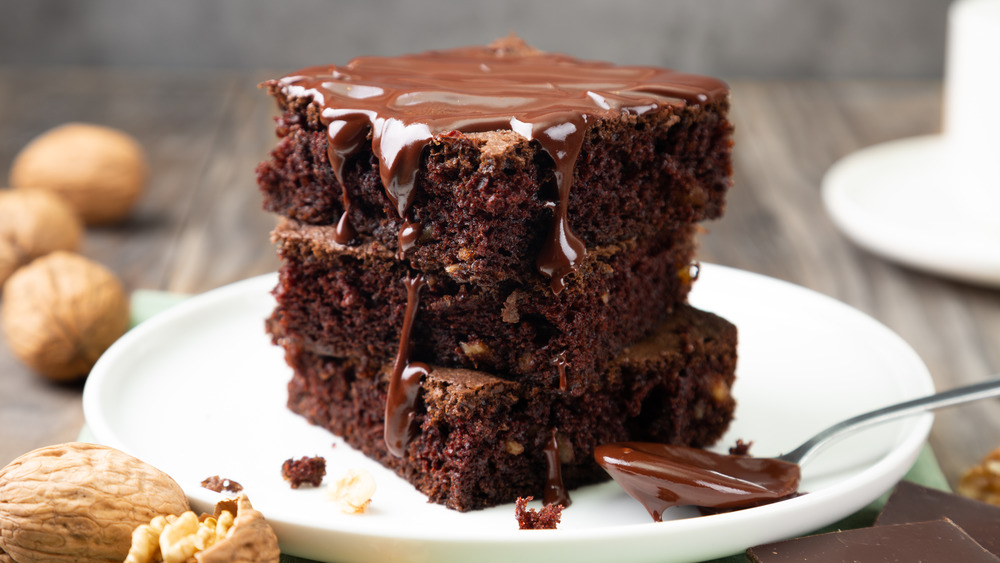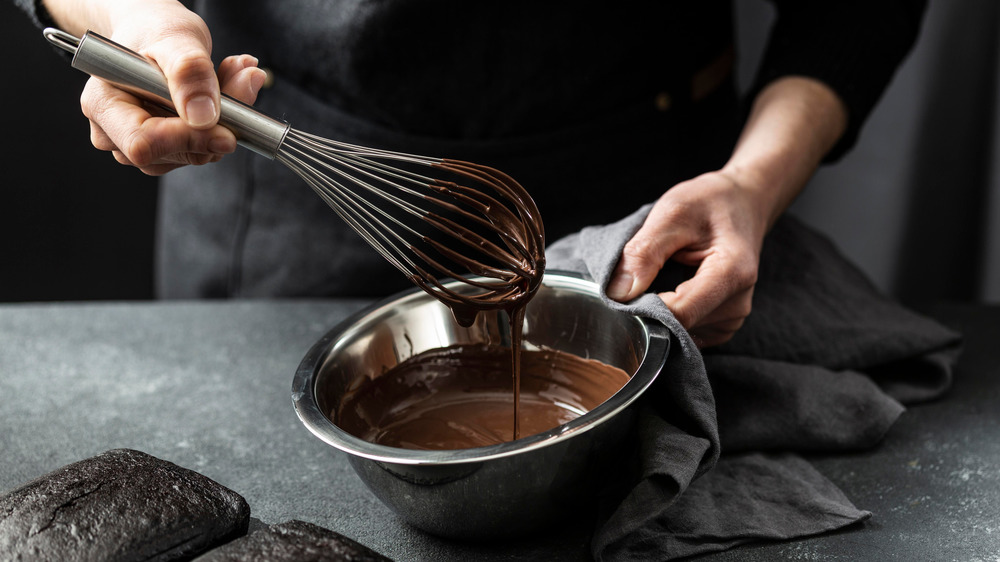Can You Really Get Addicted To Chocolate?
We've all met someone who claims to be a "chocoholic." And more often than not, the claim comes as they are mid-chew with a mouthful of — you guessed it — chocolate. Perhaps even you yourself can't say "no" to its flavor and buttery texture. Yes, this oh-so-tempting sweet comes in many forms and may be hard to turn down, but is it really possible to be addicted to chocolate?
The answer would appear to be yes if we were to base our explanation solely on cravings. And you're in good company if you know how intense those chocolate cravings can be. Greatist shares that recently, chocolate was rated the most commonly craved food for teens in the U.S., and the average yearly consumption for adults is a pretty sizeable 9.5 pounds per year!
So what's in that chocolate bar, snack, or dessert that's making it hard to live without? Let's start with the main ingredient. According to LiveScience, chocolate is harvested, fermented, and then roasted after it is taken from the fruit of the Theobroma cacao. This is a tropical tree whose name translates to "food of the gods" in Greek (very fitting).
Chocolate is a feel good food
It may be originally known as "the food of the gods," but today it is commonly referred to as a "feel good food." LiveScience claims there are many theories behind why eating chocolate can make us feel better. It could be because of the joy it brings when indulging in a piece, or our strong connections between chocolate and celebratory occasions, or because of what it is made up of. Chocolate carries substances like anandamides that stimulate the brain in the same way cannabis does. The popular sweet also contains substances that have similar effects as amphetamine, such as tyramine and phenylethylamine. So if someone is funnily claiming chocolate to be their "drug of choice," their joke actually has some truth in it.
Moving on to the second ingredient. We know cocoa to be the main ingredient in chocolate, but we can't overlook what it is most popularly paired with — sugar, sugar, and more sugar.
Sugar can be more addictive than cocaine
Some may not know this, but a mouthful of cocoa without sugar would be surprisingly bitter and unpleasant. Sugar makes for the perfect balancing act, but this ingredient is likely the one making your cravings a whole lot stronger. Cassie Bjork, RD, LD, founder of Healthy Simple Life, tells Healthline that sugar can be even more addicting than cocaine. "Sugar activates the opiate receptors in our brain and affects the reward center, which leads to compulsive behavior, despite the negative consequences like weight gain, headaches, hormone imbalances, and more," she states.
So far we've found that the two main ingredients of a typical chocolate dessert give similar effects to the brain as cannabis, amphetamines, and compulsive behavior. All signs are leading to a "yes" on the addiction question, right? Not quite. Addiction is a heavy word that many of us throw around too casually (hello "coffee addicts"). Dr. Alan Greene, a children's health and wellness expert, tells Healthline how addiction is used as a medical term. "In medicine we use 'addiction' to describe a tragic situation where someone's brain chemistry has been altered to compel them to repeat a substance or activity despite harmful consequences. This is very different than the casual use of 'addiction,'" he explains.
The debate continues between scientists
Is it possible, then, to really be addicted to chocolate? According to Healthline, the debate over chocolate addiction has been going on between scientists for years and has yet to reach a solid conclusion. It is acknowledged though, that both chocolate and sugar are ranked as two of the most highly addictive foods. As they have been the most problematic to "addictive-like" eating patterns. It is also in recent times become more common to treat food addictions with similar methods as drug addictions.
So can you be a "chocoholic?" Perhaps, if your brain and nervous system are repeatedly impacted by the substances found in both sugar in chocolate. It may be a fun expression to throw around, but the overconsumption of sugar can truly lead to a variety of severe health issues. So if you're looking for a way to still enjoy chocolate but avoid "addictive-like" symptoms, then Healthline recommends choosing dark chocolate and avoiding the chocolate-based desserts that are partnered with high amounts of fat and sugar.
If you are struggling with an eating disorder, or know someone who is, help is available. Visit the National Eating Disorders Association (NEDA) website or contact NEDA's Live Helpline at 1-800-931-2237. You can also receive 24/7 Crisis Support via text (send NEDA to 741-741).




